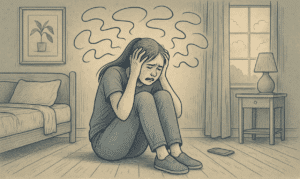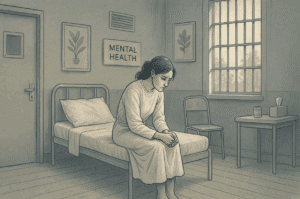Anxiety can feel overwhelming, especially for teens juggling school, friendships, and the pressures of everyday life. When a friend is going through it, you might not always know what to say or do to help them feel better. But here’s the truth: being there for your friend, even in small ways, can make a huge difference in their mental health journey. Whether they’ve opened up to you about their struggles or you’ve noticed signs that something is off, your words and actions can provide the support they need to get through tough moments.
Knowing what to say—and what not to say—can be tricky. You might worry about saying the wrong thing or making them feel worse. But don’t let that stop you from reaching out. With the right approach, you can be a source of comfort and encouragement. Below, we’ve put together some thoughtful ways to support a friend with anxiety, with language that’s relevant to your world as a teen. Your friendship could be the safe space they need right now.
1. “I’m Here for You—Whenever You Need Me.”
The most important thing you can do for a friend with anxiety is to simply be there for them. Let them know that no matter what, you’re on their side. It might seem like a small gesture, but hearing “I’m here for you” can mean the world to someone feeling isolated by their anxiety.
2. “It’s Okay to Feel Anxious. You Don’t Have to Hide It.”
One of the hardest parts of anxiety is feeling like you’re the only one going through it. Your friend might feel embarrassed or ashamed about their anxiety, but you can remind them that it’s totally okay to feel this way. Let them know their feelings are valid, and they don’t have to pretend everything’s fine when it’s not. This can create a safe space for them to open up more, which is a huge step toward healing.
3. “Do You Want to Talk About What’s Bothering You?”
Sometimes, just asking your friend if they want to talk can be a relief for them. Anxiety can be really isolating, and having someone they trust offer to listen can help them feel less alone. They might not want to share everything right away, but giving them the option to talk shows that you’re there for them, no pressure attached.
4. “How About We Do Something Together to Distract Ourselves?”
Anxiety often makes people feel trapped in their own thoughts, so offering a distraction can be super helpful. Suggest something fun or relaxing that the two of you can do together—like going for a walk, watching a movie, or even playing a video game. Sometimes just getting out of their own head for a little while can make your friend feel a lot better.
5. “What Can I Do to Help You Right Now?”
Anxiety can affect people in different ways, so what works for one person might not work for another. Rather than guessing what your friend needs, ask them directly. Maybe they’ll want advice, or maybe they just need someone to sit with them quietly. Either way, letting them know you’re willing to help in whatever way they need is a powerful gesture.
6. “You’re Not Alone—We Can Get Through This Together.”
Remind your friend that they don’t have to go through their anxiety alone. Whether it’s talking to a trusted adult, getting professional help, or just leaning on you for support, let them know that facing anxiety doesn’t have to be a solo mission. A simple reminder that you’re in this together can go a long way in helping them feel supported.
7. “It’s Okay if You Need Some Space—But I’ll Be Here When You’re Ready.”
There may be times when your friend just needs some space to sort through their thoughts. Reassure them that it’s okay to take that time, but that you’re still here when they’re ready to talk or hang out again. Giving them that breathing room shows that you respect their process while still letting them know you haven’t abandoned them.
8. “Let’s Focus on What’s Happening Right Now.”
Anxiety can often come from worrying about things that haven’t happened yet or things that are out of your friend’s control. Help them stay grounded in the present by focusing on what’s happening right now. You can even practice some simple grounding techniques together, like deep breathing exercises, that can help them relax and stay in the moment.
Supporting a friend with anxiety isn’t always easy, but your efforts can make a huge difference. Just knowing that someone cares and is willing to stand by them through the tough times can be incredibly comforting. Remember, you don’t have to have all the answers. Just being there—whether you’re talking, hanging out, or even giving them some space—shows that you’re a friend they can rely on.
If your friend’s anxiety seems like it’s too much to handle on their own, encourage them to seek professional help. At Mission Prep, we’re here to offer that extra support through our specialized teen mental health programs. Anxiety can be tough, but with the right help and the support of friends like you, no one has to go through it alone.
If you or a friend need support, don’t hesitate to reach out to us at Mission Prep. We’re here to help you navigate the challenges of mental health and anxiety together.





